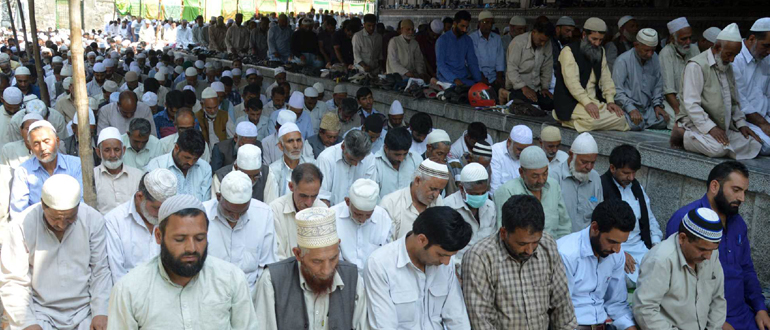Ramadan begins after the month of Shaban, after the new moon has been sighted. In case new moon is not sighted then after 30 days of Shaban, Ramadan begins.
By Syed Wajid Rizvi
Ramzan is the ninth month according to Islamic Lunar calendar. Ramzan (written as Ramadan) is derived from the Arabic root word ‘ramida’ or ‘arramad’ that means intense scorching heat and dryness, especially of the ground. Ramadan is so called to indicate the heating sensation in the stomach as a result of thirst. Others said it is so called because Ramadan scorches out the sins as it burns the ground. Some said it is so called because the hearts and souls are more readily receptive to the admonition and remembrance of Allah during Ramadan, as the sand and stones are receptive to the sun’s heat.
Ramadan begins after the month of Shaban, after the new moon has been sighted. In case new moon is not sighted then after 30 days of Shaban, Ramadan begins. The month of Ramadan lasts for 29 or 30 days depending on the sighting of the moon. If the moon is sighted on the night of 29th fast then the month of Shawwal begins from tomorrow and Ramadan is over. The 1st of Shawwal is the Eid also known as Eid-ul-fitr to distinguish it from Eid-ul-azha (Bakri Eid).
Ramadan is the month in which the Quran was revealed. The Quran clearly says “O you who believe! Fasting is prescribed to you as it was prescribed to those before you, that you many learn piety and righteousness” – Al Baqarah, 2:183. Fasting is to be done by all able bodied men and women and children who have reached puberty. If a person is sick or has some medical reason or if a women is pregnant then they are waived from fasting.
During Ramadan the people who fast are not allowed to eat or drink anything (including water) from dawn to after sunset. Also one has to restrain other body parts, which may render the fast worthless despite the main factor of hunger and thirst; so the tongue, for instance, must avoid backbiting, slander, and lies; the eyes should avoid looking into things considered by the Lawgiver as unlawful; the ears must stop from listening to conversation, words, songs, and lyrics that spoil the spirit of fasting; and finally restraining of the heart, and mind from indulging, themselves in other things besides zikr or Allah (remembrance of Allah).
Also when one is fasting and feels hunger and thirst he has to remember other people in the world who do not have food and water. Charity is one of the extremely recommended acts during fasting. Muslims are required to give minimum of 2.5% of their annual savings as charity to poor and needy people. Also there are various sayings of the prophet (pbuh) where he has said that any charity made in Ramadan is multiplied upto 70 times. If some people are poor and cannot afford to give money then even a smile is an act of charity.
In recent years lot of research has been done about the medical benifits of Ramadan. The physiological effect of fasting includes lower of blood sugar, lowering of cholesterol and lowering of the systolic blood pressure. In fact, Ramadan fasting would be an ideal recommendation for treatment of mild to moderate, stable, non-insulin diabetes, obesity and essential hypertension. There are psychological effects of fasting as well. There is a peace and tranquility for those who fast during the month of Ramadan. Personal hostility is at a minimum, and the crime rate decreases. Muslims take advice from the Prophet who said, “If one slanders you or aggresses against you, say I am fasting.'” This psychological improvement could be related to better stabilization of blood glucose during fasting as hypoglycemia after eating, aggravates behavior changes. There is a beneficial effect of extra prayer at night. This not only helps with better utilization of food but also helps in output. There are 10 extra calories output for each rikat of the prayer. Again, we do not do prayers for exercise, but a mild movement of the joints with extra calorie utilization is a better form of exercise. Similarly, recitation of the Quran not only produces a tranquility of heart and mind, but improves the memory. There is a beneficial effect of extra prayer at night. This not only helps with better utilization of food but also helps in output. There are 10 extra calories output for each rikat of the prayer. Again, we do not do prayers for exercise, but a mild movement of the joints with extra calorie utilization is a better form of exercise. Similarly, recitation of the Quran not only produces a tranquility of heart and mind, but improves the memory.
Some people think that one month of fasting is too much while others feel that it’s only one month where they can get their sins forgiven and get their rewards increased. May Allah bless us all and forgive all our sins and make us good Muslims and good human beings.



